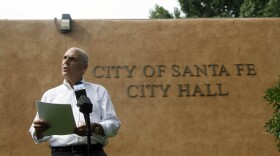
Kaveh Mowahed
Reporter, News HostKaveh Mowahed has filled several roles in KUNM’s news department over the years while working toward a PhD in the History of Medicine at UNM. He started as an intern in 2013 and has been a reporter, producer, host, and data analyst with us since then. Kaveh studied print journalism at Arizona State University, but soon after earning a bachelor’s degree he found his love for radio. Kaveh thinks hearing is the most valuable of the senses because of how it engages the imagination. When he’s not reporting or editing audio for the radio, he loves being home listening to records or romping around the mountains on a bicycle or snowboard.
-
New Mexico’s 112 legislators and their staffs plus more than 400 more aides, pages and security personnel at the Roundhouse, and the countless advocates and lobbyists, are all flooding into Santa Fe for the session. So where do they stay? And where do they eat? And what about entertainment? On the next Let’s Talk New Mexico we’ll discuss the session’s effects on the city.
-
There’s been talk of investing in the state fairgrounds for decades, but this time millions are being spent to support planning and community engagement, and some options have gone public. So, how will it affect the surrounding neighborhoods, and, is there a plan to make sure gentrification doesn’t displace folks? What do you expect from a redeveloped fairgrounds in the coming years?
-
We’ve heard from unhoused folks that having a pet gave them a reason to survive when they otherwise may have given up. But when people are having trouble taking care of themselves, is it fair for their animal companions to also suffer?
-
Maybe the most overlooked part of going anywhere in a car is parking once you’re there. We assume there will be a spot for our car, either at a business, or on a street, or in a garage. But should we expect parking? How much should it cost us and how much does it cost to provide? And should we presume it will be safe for us and our property?
-
Let’s Talk New Mexico, 10/30/25 There are about twenty data centers in our state, including a big one owned by Meta in Los Lunas. They’re also in Albuquerque, Taos, Clovis and Sunland Park, and the rush is on to build more. However, people who live nearby worry about water and energy usage, and whether these developments really benefit their communities.
-
Early voting will start soon and run through November 1st, and several cities in our area will choose new mayors. Old fashioned images of mayors have them greeting families on downtown streets, checking in on local businesses and directing city police, but is that really how they spend their days?
-
The end of summer comes with a welcome drop in temperatures, leaves starting to change color, and the smell of roasting chile in the air. Farmers are busy and so are farmer’s markets. It’s harvest time.
-
Whether you live in Albuquerque, or down South, or in Santa Fe, or cooler areas that historically haven’t been their home, a warming climate is leading to a broader range and longer season for mosquitoes and other pests.
-
President Trump’s One Big Beautiful Bill Act will cut incentives for wind, solar and electric cars and will ease restrictions on fossil fuels which contribute to a warming climate and severe weather. On the next Let’s Talk New Mexico we’ll ask, where does this leave our state as we grapple with renewable energy development while banking on oil and gas?
-
Our state's mountains, deserts, caverns and culture draw tourists from around the world, but a changing climate and more severe weather are threatening those places and that important part of our economy. How can we protect our natural and cultural treasures from fires and floods? Should we still visit places after a disaster hits?










